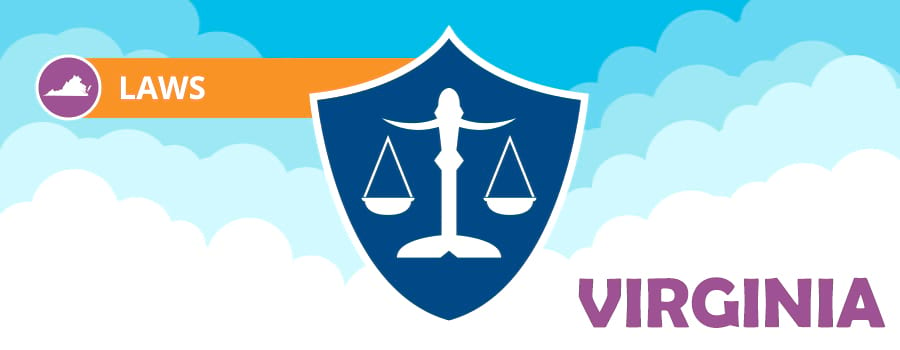Virginia Homeschool Laws
What are the requirements for homeschooling in Virginia?
Virginia homeschool laws outline three basic options for home instruction in the state:
- Follow the Virginia Home Instruction Statute, which regulates that homeschool parents must meet specific educational criteria, file a notice of intent to homeschool, comply with immunization requirements, and submit evidence of academic achievement annually
- Teach under a certified tutor provision
- Claim the religious exemption statute for a bona fide excused attendance from public schooling based on sincere religious conviction
This page will detail more about these options for homeschooling in Virginia and will guide parents and students toward the key information they need to know when starting to homeschool in the Old Dominion state.
- Virginia Homeschool Requirements
- Your Notice of Intent
- Switching from Public School to Homeschool
- Homeschool Recordkeeping in Virginia
- Virginia Homeschool Graduation Requirements
- Enrolling in Public School after Homeschooling in VA
- Additional Resources for Homeschooling in Virginia
*This should by no means be interpreted as legal advice. It is your responsibility to interpret and understand the laws that you will be homeschooling under.
Virginia Homeschool Requirements
The compulsory attendance law in Virginia relates to children who are between the ages of 5 and 18. It is completely legal, however, for parents to use home education in lieu of school attendance to meet compulsory requirements. Most families who homeschool in Virginia choose the option outlined in the Virginia Home Instruction Statute. This statute mandates four main requirements of homeschool families:
- A notice of intent to instruct a child from home
- Evidence of at least one of the following: parent holds a high school diploma or equivalent (or higher), parent holds a teacher certification, student will be enrolled in a correspondence course/distance learning program, or evidence that parent is able to provide adequate education for a child
- Submission of a list of subjects to be studied in the coming year
- Evidence of academic progress submitted by August 1 of each year
More information relating to the home education rules for Virginia can be found at A2ZHomeschooling.com.
Full Details of Virginia’s Homeschool Laws
Requirements to teach under a certified tutor provision in Virginia
For those families choosing to homeschool under the certified tutor provision, the following requirements should be noted:
- The tutor or teacher must be certified by the state of Virginia
- The teacher certification must be approved by the superintendent of schools
- Any parent or non-parent who is certified can teach the student
- Instruction can take place in or outside the home
- No yearly assessment or notifications are required as long as the teacher’s credentials are up-to-date
Requirements to claim the religious exemption statute in Virginia
Choosing the religious exemption from public schooling will only apply to a select group of families. Those families must:
- Have sincere convictions against sending their child to school
- Not base those convictions on political, sociological or philosophical views or a merely personal moral code
- Be prepared to provide proof of your convictions to a Virginia school board
Your Notice of Intent
When homeschooling under the Home Instruction Statute, parents must submit a notice of intent to homeschool to their local school division superintendent by August 15. (Note: families may begin to homeschool at any time of the year, however. Once your superintendent has received your NOI, you may begin legally homeschooling your child.) Your notice of intent does not have to be an official form, although your local division office may offer one. It can simply be a letter stating which option you are choosing to homeschool under and providing proof that you qualify for that option.
Examples of proof of qualification might include a copy of your high school (or college) diploma or transcript, a copy of a teacher’s certification, or proof of enrollment in a correspondence school.Your notice of intent should also include a list of subjects you plan to study in your upcoming homeschool year. It is a good idea to submit your notice of intent via certified mail with a request for return receipt so that you have evidence of your submission, although some school districts provide online portals for such submissions.
Switching from Public School to Homeschool
If your child is currently enrolled in a public school, there is no formal requirement in Virginia that families notify their current school when transitioning to homeschooling. However, informing your current school of your decision has the advantage of preventing any truancy questions or complications during the shift. It is important, however, that you file your notice of intent to homeschool and receive confirmation of its submission before pulling your child from school.
Homeschool Recordkeeping in Virginia
When using the Home Education Statue option in Virginia, parents have specific information they need to submit to their school district annually to show evidence of academic progress . This evidence can take one of two formats:
- results from a nationally normed standardized test
- an evaluation or assessment
For those choosing the standardized test format, Virginia homeschool law specifies that students must have “a composite score in or above the fourth stanine on any nationally normed standardized achievement test; or an equivalent score on the ACT, SAT, or PSAT test.” For those choosing the evaluation/assessment option, this could be a letter from a Virginia certified teacher who has reviewed the child’s academic progress or it could be a report card/transcript from a community college, correspondence school, etc.
Even though those are the minimum records required by Virginia homeschoolers, that does not mean that they are the only items you should track in your homeschooling. You will discover that any future transitions in educational status such as moving back to school after homeschooling, applying for college, or enlisting in the military will all go more smoothly if you have kept comprehensive records of your homeschool activities. In addition to your standardized test scores or evaluation, you may also want to keep a homeschool portfolio that includes an overview of the curriculum you’ve used as well as samples of assignments completed by your student, quizzes or tests, and written work. (This is something that Time4Learning’s curriculum makes very easy!) For high school homeschoolers, you might also want to include a detailed transcript.
Virginia Homeschool Graduation Requirements
So, what if you decide to continue your homeschooling journey all the way through your child’s senior year? You will want to know what it takes to graduate a student from a home education program. Virginia homeschool law has no specific guidelines in terms of homeschool graduation, which means that there is nothing you need to do–from a legal standpoint–to show that your teen has completed a specific course of study.
However, there is plenty you need to do to truly prepare him or her for life after high school! This starts by having in-depth discussions with them about their goals. Will they want to pursue college, enter the military, take vocational training, or possibly jump right into the workforce? Their personal ambition will be the driving force behind your high school curriculum. For example, if your teen knows he wants to enter a four-year college, you can survey the admission requirements for colleges he may be interested in, and align your program with those.
Another helpful planning tool is knowing what is expected of traditionally schooled students in Virginia. Below, you’ll find a chart that will allow you to compare what the path to a diploma looks like for both public school students and homeschooled students in Virginia.
| Public/Private School | Homeschool | |
|---|---|---|
| Virginia diploma requirements | Students must have a minimum of 22 completed credits to graduate in Virginia and receive a diploma. | Parents determine when their student has fulfilled graduation requirements and can issue their own homeschool diploma; students of private/online schools may receive diplomas from those institutions. |
| Virginia high school testing requirements | There are no graduation testing requirements for the state of Virginia. | Homeschool students are also not subject to testing requirements for graduation. |
| Virginia high school transcripts | VA public school transcripts include identifying information, standardized test scores, attendance information, credit totals and a complete credit history by course including course titles, grades received each semester, and cumulative grade average for each. | Homeschool parents may create their own student transcripts, and may include any information they deem pertinent to colleges, military, and/or future workplace organizations. |
| Virginia high school course credits | In order to graduate, VA high schoolers must have 4 English credits, 3 mathematics credits, 3 laboratory science credits, 3 social studies credits, 2 health and physical education credits, 2 foreign language, fine arts or career and technical education credits, 1 economics and personal finance credit, and 4 elective credits. | Parents determine when their student has fulfilled graduation requirements; for the purpose of creating transcripts, some homeschool parents do assign credits to individual courses. |
| GED eligibility | Students who are at least 18 years old, are not currently enrolled in a public school, and have not earned a high school diploma from a public or private high school are eligible to apply to take the General Education Diploma test. | The same requirements for eligibility apply to homeschoolers as to public school students. |
Enrolling in Public School after Homeschooling in Virginia
The time that a family spends homeschooling is subject to many different factors. Some will homeschool from kindergarten all the way through graduation. Others may only need to homeschool during a specific school year. If, for any reason, you need to return your child to public school after a period of homeschooling, you will need to follow the enrollment requirements of that specific school.
Some schools may request to review your homeschool records to help with grade level placement. Others may even require additional testing or evaluations before establishing enrollment. Each school division also makes its own decisions in how to transfer high school level credits and grades.
Additional Resources Related to Homeschooling in Virginia
Have other questions about homeschooling in Virginia? You may find the following pages helpful.
- Homeschooling in Virginia
- Virginia Homeschooling Groups & Co-ops
- Virginia Homeschool Associations
- Homeschool Field Trips in Virginia
Welcome to Homeschooling Guide
Download this FREE resource where experienced homeschoolers share their stories for how to begin homeschooling, understanding your child academically, planning your days, and much more.







